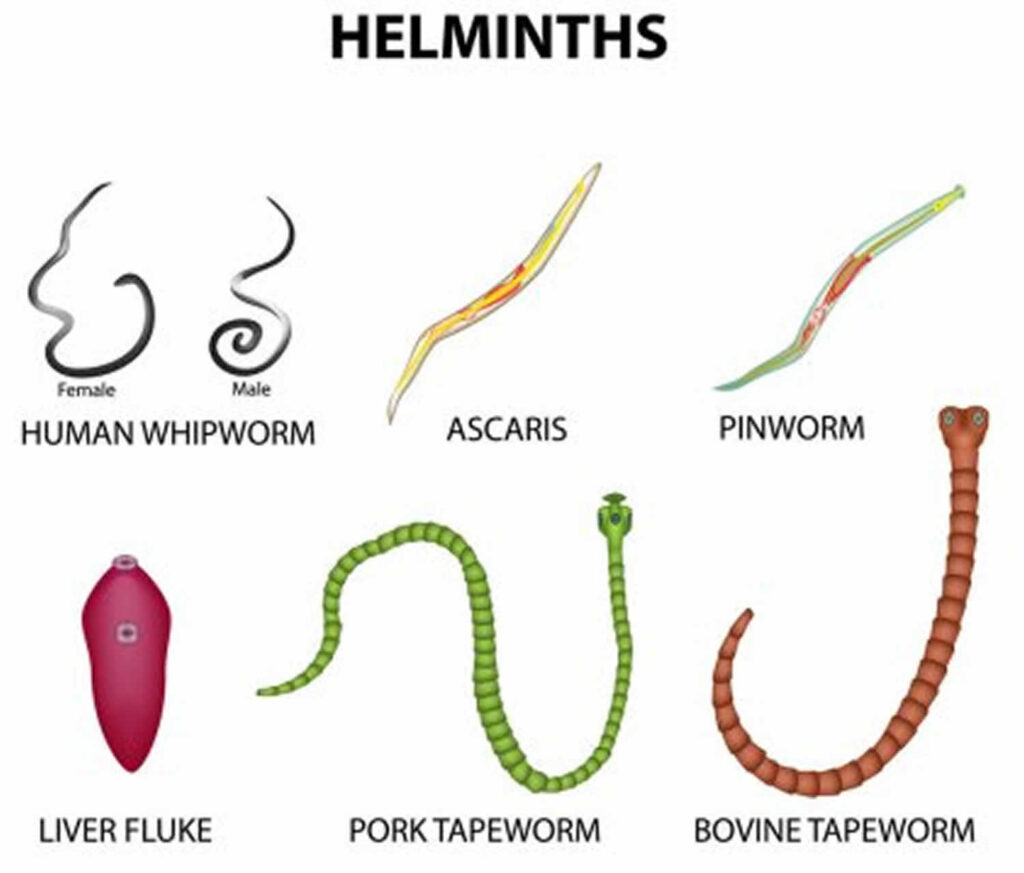Mixed intestinal helminthiasis refers to an infection caused by multiple species of parasitic worms, including nematodes (roundworms), cestodes (tapeworms), and trematodes (flukes). These parasites colonize the gastrointestinal tract, leading to various health complications.

Causes and Risk Factors
Common Helminth Species
- Ascaris lumbricoides (Roundworm)
- Trichuris trichiura (Whipworm)
- Ancylostoma duodenale and Necator americanus (Hookworms)
- Taenia spp. (Tapeworms)
- Schistosoma spp. (Blood flukes)
Transmission Routes
- Contaminated food and water: Ingesting eggs or larvae from infected sources
- Soil contact: Exposure to infected soil, common with hookworm infections
- Poor hygiene: Lack of handwashing and unsanitary conditions
- Close human contact: Direct transmission from an infected person
High-Risk Groups
- Children in endemic regions
- Individuals with compromised immune systems
- Communities with poor sanitation and limited healthcare access
Symptoms of Mixed Intestinal Helminthiasis
Symptoms vary based on the helminth species involved but commonly include:
- Gastrointestinal issues: Abdominal pain, diarrhea, nausea, and bloating
- Nutritional deficiencies: Malabsorption leading to anemia and weight loss
- Fatigue and weakness: Due to iron-deficiency anemia
- Skin irritation and rash: Common in hookworm infections
- Intestinal obstruction: Severe cases with large worm loads
Diagnosis and Laboratory Tests
Stool Examination
- Microscopic analysis: Identifies eggs, larvae, or worm segments in stool samples
- Concentration techniques: Enhances detection of low parasite loads
Serological Tests
- ELISA (Enzyme-Linked Immunosorbent Assay): Detects helminth-specific antibodies
- PCR (Polymerase Chain Reaction): Identifies worm DNA for precise diagnosis
Imaging and Endoscopy
- Ultrasound/X-ray: Detects tapeworm cysts in organs
- Colonoscopy: Identifies worms attached to the intestinal wall
Health Complications
- Severe malnutrition: Chronic infections hinder nutrient absorption
- Anemia: Hookworms and whipworms cause blood loss
- Intestinal perforation: Large worm burdens can damage the gut lining
- Cognitive impairment: Common in children with prolonged infections
Treatment and Management
Antiparasitic Medications
- Albendazole and Mebendazole: Broad-spectrum anthelmintics
- Praziquantel: Effective against tapeworms and schistosomes
- Ivermectin: Used for strongyloidiasis and other nematodes
Supportive Therapies
- Iron and vitamin supplements: Correct anemia and deficiencies
- Probiotics: Restore gut microbiota balance post-treatment
- Nutritional support: High-protein diets aid recovery
Prevention Strategies
- Improved sanitation: Access to clean water and proper waste disposal
- Regular deworming programs: Mass drug administration in endemic areas
- Personal hygiene: Handwashing, wearing shoes in contaminated soil
- Safe food handling: Cooking meat thoroughly and washing produce
Mixed intestinal helminthiasis poses significant health risks, particularly in resource-limited settings. Early diagnosis, effective treatment, and preventive measures are essential in controlling its impact on global health.

